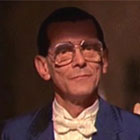The text below is from a graded reader of the novel [ Do Androids Dream of Electric Sheep? ] .
- Which parts of the video are the same as the novel?
- Which parts of the video are different from the novel?
- Which parts of the novel are not in the video?
When Rick landed the police hovercar on the roof of the Rosen Corporation Building, a young woman was waiting for him there. She was a thin woman with black hair, and she was wearing thick glasses to protect herself from the dust. She did not look happy to see him.
"I'm Rachael Rosen," she said, holding out her hand. "I guess you're Mr. Deckard."
"This wasn't my idea," he answered.
"Yes, Inspector Bryant told us that. But you’re here for the San Francisco police, and the police never believe that we’re working to help the public."
"Androids can be useful one moment and dangerous the next. They’re not a problem for us as long as they serve their true purpose," Rick said.
"But when they’re considered dangerous, it's your job to kill them, isn't it, Mr. Deckard?" said Rachael Rosen coldly.
"Have you chosen the group for me?" Rick asked. He had no wish to discuss his job with the woman. "I’d like to..."
He stopped as he noticed the animals behind her. He had never seen so many in one place. The cages were guarded by men in company uniforms with machine guns, and the men's eyes were watching Rick carefully. He checked his Sydney's guide. Some of those animals did not even have a price. The owl, for example. He stared at the bird, then realized that the girl was speaking again.
"What kind of animal do you have?" Rachael's voice seemed a long way away.
"A sheep," he answered slowly.
"Well, then you should be happy."
"I am happy," he said. "But I’d love to own an owl." He pointed at the bird in front of him. "I always wanted one, even before they all died... All except yours, that is." He turned away. "I’d like to do the tests now. Can we go downstairs?"
"I expect Uncle Eldon has arranged everything by now," Rachael replied without expression. She turned her back and walked towards the door. Rick followed her, surprised that the large corporation was in fact a family business.
"Why don't you like me?" he asked Rachael while they travelled down together to the lower floors.
"If your test doesn't work, we’ll have to take all Nexus-6 types off the market." Her black eyes were fierce now as she frowned at him. "Just because you police aren't able to do the simple job of recognizing the tiny number that get out of control."
An older man was waiting for them downstairs. He had a worried expression on his face. "I’m Eldon Rosen," he explained to Rick. They shook hands. "This is very short notice, but we’ve done the best we can."
Rick became more confident. They’re afraid of me, he realized. I can probably stop them producing the Nexus-6, and that could have a serious effect on the future of the corporation.
The Rosens led him into a small room full of beautiful furniture. He sat down next to an expensive-looking coffee table and took out his Voigt- Kampff instruments. "You can send in the first testee," he informed Eldon Rosen, who was looking more and more anxious.
"What do those instruments measure?" Rachael asked.
"They measure tiny movements in the eye muscles and under the skin of the face when people are shocked by something that's said to them. It doesn't matter what people actually say - it's the physical reactions that they can't control which are important."
"Give me the test," Rachael ordered.
"Why?" Rick asked, puzzled.
"We chose her as a testee," Eldon Rosen answered. "She may be an android. We’re hoping you can tell." He lit a cigarette and sat down to watch. Rick attached wires to Rachael's face and shone a thin white light into her left eye. Then he sat in front of his instruments.
"I'm going to talk about a number of situations," he told Rachael. She seemed calm. "I want you to tell me how you feel about each one as quickly as possible." Rick chose question three. "Right. You are given a leather wallet on your birthday."
The needles on his instruments immediately moved up past the green and into the red, then down again.
"I wouldn't accept it," Rachael said. "And I’d report the person who gave it to me to the police."
Rick made notes and then continued. "You have a little boy and he shows you his insect collection, including his killing bottle."
"I’d take him to the doctor." Rachael's voice was low but confident.
The needles moved again, but not so far. He made another note.
"In a magazine you see a full-page colour picture of a girl, wearing no clothes." Rick paused.
"Are you testing whether I’m an android or whether I like women?" Rachael asked sharply. The needles did not move.
He continued: "Your husband likes the picture." Still no reaction. "The girl," he added, "is lying on a large and beautiful sheepskin carpet." Nothing.
An android reaction, he said to himself. Her mind is not on the dead animal.
"Your husband hangs the picture on the wall of his study," he finished, and this time the needles moved.
"I wouldn't let him," Rachael said.
"OK," Rick answered. "Now, you’re reading a book written in the old days before the war. The characters become hungry and go to a seafood restaurant. One of them orders lobster and they all watch while the cook drops the lobster, alive, into boiling water."
"Oh!" Rachael said. "That's awful! Did they really do that?" A correct spoken reaction, but the needles did not move. Rick asked a few more questions to check that he was right.
"You\re an android," he told her - or it. He turned to Eldon Rosen, who was looking angry as well as anxious. "I’m right, aren't I?" he asked. There was no answer. "Look," he said, "we both want this test to work."
"She's not an android," Rosen said.
"I don't believe it."
"Why would he lie?" Rachael said to Rick fiercely.
"I can explain why my niece failed your empathy test," the old man said. "She was born on a spaceship and lived there for fourteen of her eighteen years. All she knew about Earth came from the nine other people on the ship, and from cassettes."
"Outside this building, you would kill me," Rachael said to Rick. "I’ve known that since I arrived on Earth."
"What were your orders," Eldon Rosen asked, "if your test results showed a human as an android?"
"To stop the testing," Rick replied, packing his instruments away again.
"The test has failed." Bryant was right, he thought. I could have killed an innocent person using this test. "The problem," he went on, "is that you continue to make androids that are more and more like humans, so now..."
"We only make what people who emigrate want," Eldon Rosen said. "If we don't make them, other companies will. Your Voigt-Kampff test was a failure before we produced the Nexus-6 android. You’ve probably killed other people with underdeveloped empathy reactions, like my niece here. The police are the ones with the problem, not us."
"So now I’ll never be able to test a Nexus-6," Rick realized. "The test is useless."
"That's right, Mr. Deckard," Rachael Rosen agreed. Then she smiled.
"And if you can't use the test, you can't find the androids, or kill them, or earn your money."
"Your boss, Inspector Bryant," Eldon Rosen said, "won't understand why you let us defeat your test before it began. But don't worry, Mr. Deckard. I’m sure that together we can find a way for you to continue to do your work."
Rachael looked at her uncle and then returned to her seat. Rick put his black leather bag on the table, took out his instruments, and attached the wires to Rachael's face.
"Do you like my bag?" he asked her, as he searched for his question papers inside it.
"Yes, yes," she answered, without interest.
"It's made from the skin of human babies," Rick explained. There was a pause, and then the needles moved violently. Too late. There should have been no reaction time. "Thanks, Miss Rosen," he said, and put everything away again. "That's all."
"You’re leaving?" Rachael asked.
"Yes," he said. "You’re an android, and the test works. Does she know?" he asked Eldon Rosen, who was looking very unhappy. Sometimes androids didn't know because false memories were programmed into their brains.
[ printable .pdf ]
 English
English Português
Português Español
Español 한국어
한국어

